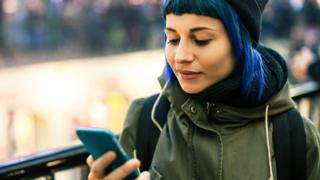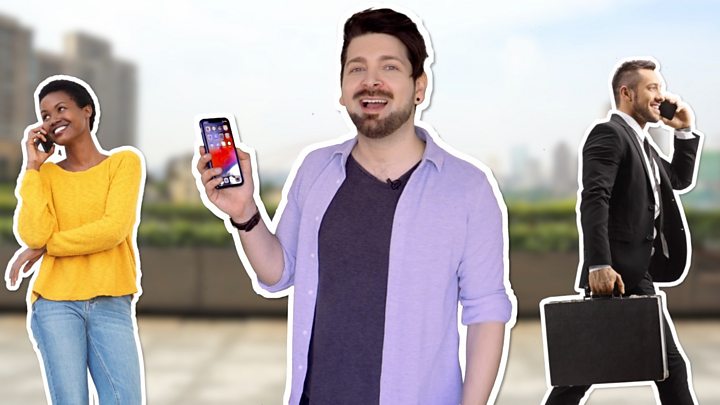 Image copyright
Getty Images
Image copyright
Getty Images
Millions of people in the UK will soon be asked to monitor their movements, to limit the spread of coronavirus.
The trial of a "test, track and trace" programme started on the Isle of Wight in early May. All 80,000 households on the island were asked to download a smartphone app designed to quickly trace recent contacts of anyone with the virus.
Within a week, the app had been downloaded about 55,000 times. If it's judged successful, a nationwide programme will be rolled out within weeks. Hiring is now under way for an ''army'' of contact tracers, including thousands of call handlers.
What is contact tracing?
Contact tracing is used to slow down the spread of infectious outbreaks.
When someone gets coronavirus, everyone they have been in prolonged contact with will be tracked down and potentially asked to self-isolate.
Phoning or emailing the friends and family of coronavirus patients is one way of contact tracing
This can be combined with a location-tracking mobile app, to pick up others they have been in contact with, for example on public transport.

Contact tracing is already being used by various countries, including Hong Kong, Singapore and Germany.
The UK is planning to roll out its contact tracing app and phone team by the middle of May.
What will contact tracing look like in the UK?
The government is getting ready to deploy a contact tracing team of 3,000 civil servants and health workers, and 15,000 call handlers. It has posted several job adverts for people who are unemployed and keen to help handle the calls, subject to a two week training programme.
Their telephone tracing will be used alongside the smartphone app.
The free app tracks when users come into contact with each other. Once downloaded, the app runs in the background of your phone, provided Bluetooth is switched on.
If a user develops coronavirus symptoms, it is up to them to let the app inform the NHS.
That message may trigger an anonymous alert to users with whom they recently had significant contact, potentially asking those people to go into quarantine or be tested.
Why was the Isle of Wight chosen for the trial?
Health Secretary Matt Hancock says the elderly population on the island - and estimated lower number of smartphone users - was a factor. If it is successful despite these challenges then that will show it can work across the UK.
John Newton, the UK government's testing coordinator, says that relatively restricted travel to the island makes it an "ideal place" to study the spread of a virus.
Will contact tracing help end lockdown?
Contact tracing has been credited with helping to lift restrictions in other countries, when combined with other measures.
South Korea never went into lockdown thanks to an early strategy of extensive tracing and mass testing. There was manual monitoring of credit card transactions, CCTV and mobile phone tracking to piece together where people had been.
The UK probably won't use that level of tracking but a widely used app would allow the government to ease some restrictions.
Take-up will have to be colossal for the virus to be totally supressed. Academics advising the NHS estimate 80% of smartphone users - 60% of the population - would have to actively use it.
By comparison, about 67% of UK smartphone users have downloaded messaging app WhatsApp.
The academics' model does not take into account the over-70s, due to their average low smartphone usage, and the assumption many will be shielding and so not coming in to contact with lots of other people.
People would also have to be honest about displaying any potential symptoms and inform the NHS.
What if I don't have a smartphone?
Only people with a smartphone can access the app. As it launched the Isle of Wight trial, the government said there would be an option for people to report symptoms and order tests in other ways, including over the phone and via an online service.
Everyone who reports falling ill, including app users, will be asked to record recent contacts either online or via telephone - so the hope is that tracers can reach all those at possible risk, not just people with the app.
One idea is that those without smartphones could end up wearing a Bluetooth-enabled wristband, like those used in other countries to detect lockdown breaches.
What can the government do with my data?
Not everyone is happy with the government and third parties being given access to people's data. Civil rights group Liberty said the government must take the risks seriously, and should not make installing the app a condition to leaving the lockdown or returning to work.
''Millions of us are going to need to trust the app and follow the advice it provides,'' says NHSX, the technology arm of the health service. It says the information gathered will only ever be used for health and research purposes, and that the app can be deleted at any time.
The UK app will use a "centralised model", meaning the matching process will take place on a computer server.
An alternative, decentralised model was put forward by Apple and Google, where the exchange happens on people's handsets.
The tech giants say their version makes it harder for hackers or the authorities to use the computer server logs to track and identify specific individuals.
But NHSX says its centralised system will help give it more insight into how the disease spreads and help it to make the app more efficient.
Mr Hancock said the app will take "full consideration" of privacy concerns.